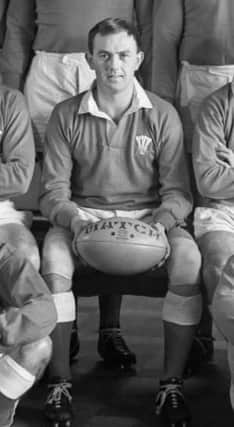Nostalgia: ‘The worst game of rugby ever?’


How about the opposite choice? The worst-ever game you have ever seen.
The recent Scotland-England game at Murrayfield, which was boring, dull and spoiled by the weather, pales into insignificance when compared to the Snore Fest that was the Scotland-Wales encounter of 1963.
Advertisement
Hide AdAdvertisement
Hide AdThe game finished with Wales winning 6-0, but low scores were not uncommon back in those days.
It was another statistic that ruined the game and was eventually to lead to a change in the laws.
Scotland went into the game on February 2 with a degree of confidence, especially after an 11-6 win in Paris.
Wales had gone down at an ice-covered Cardiff Arms Park 13-6 to eventual champions England.
Advertisement
Hide AdAdvertisement
Hide AdThe Welsh captain was their scrum-half Clive Rowlands who was later to become a leading coach, but he won few friends that day in Edinburgh.
In those days, some laws were quite different.
Lifting in the line-out was a penalty offence and you could kick directly into touch anywhere on the pitch.
The programme notes gave an ominous forecast of what was to come.
“Rowlands is an exceptionally clever tactical kicker.”
This was to be his second cap and he had been made captain on his debut against England.
Advertisement
Hide AdAdvertisement
Hide AdThe weather was typical of Scotland in February, and the game only went ahead thanks to Murrayfield’s revolutionary undersoil heating system and the efforts of volunteers who had shovelled overnight snow off the pitch.
Rowlands had realised that Wales had a two-stone advantage in the forwards and so decided to make the game a forward battle, keeping the game tight.
The crowd of 60,000, huddled together on the open terraces, saw a Welsh win by six points to nil, but the real loser was the game of rugby itself.
Only two scores were recorded, a penalty by full-back Grahame Hodgson after quarter of an hour’s play and a drop goal from Rowlands fifteen minutes into the second half.
Advertisement
Hide AdAdvertisement
Hide AdIronically, these were the only points he scored in his entire international career.
Rowlands controlled the game, but a more realistic description would be he “killed” it off.
Not once did the ball reach the centres from the stand-off and Wales had some talented backs.
Stand-off David Watkins, who was later to enjoy success in Rugby League with Salford, reckoned he touched the ball five times in the whole match.
Twice he caught a pass from scrum-half Rowlands.
Advertisement
Hide AdAdvertisement
Hide AdScotland weren’t much better and seemed content to play the same forward game that had brought such success in Paris.
Their dominance of the scrums at 25-13 was impressive, including three against the head and they weren’t far behind in the lineouts with 30 compared to Wales winning 37.
The telling fact is that 44 of the lineouts degenerated into mauls.
The final count was a total of 111 lineouts- a figure almost unimaginable in the modern game.
It didn’t make for exciting watching – or viewing.
Advertisement
Hide AdAdvertisement
Hide AdAt full-time, Rowlands was cheered off the pitch by joyous Welsh supporters, while several Scots, who had not yet succumbed to frostbite or hypothermia, threw snowballs in disgust at his display.
Almost unbelievably, Terry O’Connor, writing in the Daily Mail, hailed it as “the greatest individual display I can remember in an international. He seemed to control every move of the match, even those of his Scottish opponents.”
Rowlands’ tactics tired the Scottish forwards and obviously hit their morale.
What made the ploy so incomprehensible was the quality of the Welsh threequarters who hardly saw any action.
Advertisement
Hide AdAdvertisement
Hide AdOlder supporters wondered what had happened to their game and one comment in the Daily Herald seemed to strike a chord.
“International Rugby is in its death throes as a spectator sport.”
Wales won by taking modern power rugby to its logical conclusion.”
Wales won and so avoided a whitewash, but not the Wooden Spoon as they lost to both Ireland and France.
Advertisement
Hide AdAdvertisement
Hide AdPost- script: Clive Rowlands went on to win 14 Welsh caps, all as captain, and eventually became manager of Wales and the British and Irish Lions.
Later he was appointed as president of the Welsh Rugby Union and became a successful broadcaster.
Seven years later, the laws of the game were permanently changed to outlaw direct kicking for touch from outside the 25-yard line.
Australia had been pushing for this change for some time, but 60,000 people at Murrayfield would eagerly have given evidence in support of the motion.
Afterwards Rowlands remained unrepentant.
Advertisement
Hide AdAdvertisement
Hide AdHe said: “It was not an attractive match and I felt sorry for the backs.
“But we were out to win, and the pack did a great job.
“I was never at any time to open the game up and let my backs make the running.
That’s what Scotland were praying we’d do.”